Oberwiesenthal
Oberwiesenthal (German: [oː.bɐ.ˈviː.zn̩.taːl] (![]()
Oberwiesenthal | |
|---|---|
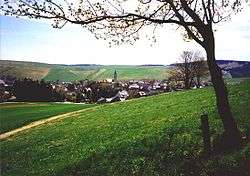 May 2001 view of Oberwiesenthal | |
 Coat of arms | |
Location of Oberwiesenthal within Erzgebirgskreis district 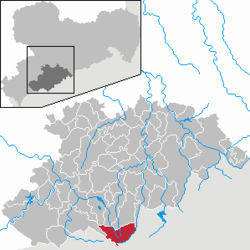 | |
 Oberwiesenthal 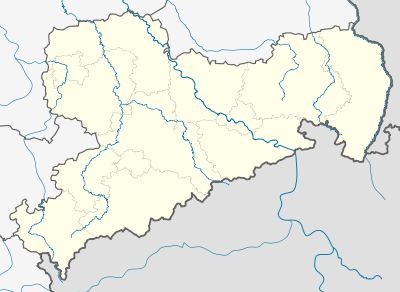 Oberwiesenthal | |
| Coordinates: 50°25′9″N 12°58′15″E | |
| Country | Germany |
| State | Saxony |
| District | Erzgebirgskreis |
| Government | |
| • Mayor | Mirko Ernst |
| Area | |
| • Total | 39.98 km2 (15.44 sq mi) |
| Elevation | 914 m (2,999 ft) |
| Population (2018-12-31)[1] | |
| • Total | 2,075 |
| • Density | 52/km2 (130/sq mi) |
| Time zone | CET/CEST (UTC+1/+2) |
| Postal codes | 09484 |
| Dialling codes | 037348 |
| Vehicle registration | ERZ, ANA, ASZ, AU, MAB, MEK, STL, SZB, ZP |
| Website | www.oberwiesenthal.de |
Geography
Oberwiesenthal lies in the county of Erzgebirgskreis, on the border with the Czech Republic that follows the course of the Pöhlbach stream as far as Bärenstein (10 km northeast). The highest elevation in the borough is the Fichtelberg (sometimes called the Großer Fichtelberg or Great Fichtelberg) which, at 1,215 m above NN, is the highest mountain in Saxony.
Other important mountains in the region around Oberwiesenthal are the:
- Keilberg (Klínovec) (1,244 m above NN; the highest summit in the Ore Mountains)
- Kleiner or Hinterer Fichtelberg (1,206 m above NN) ("Little or Farther Fichtelberg")
- Eisenberg (1,029 m above NN)
-Deutschland.png)
Neighbouring municipalities
On the Czech side is the municipality of Loučná pod Klínovcem (Böhmisch Wiesenthal) and, further west, is Boží Dar (Gottesgab). Adjacent municipalities in Germany are Bärenstein, Crottendorf, Sehmatal, Breitenbrunn/Erzgeb. and Raschau-Markersbach.
Subdivisions
- Oberwiesenthal
- Unterwiesenthal
- Hammerunterwiesenthal
- Rotes Vorwerk
- Neues Haus



History
The "new town in the Wiesen valley" ("Neustadt am Wiesenthal") was founded in 1527 by the lords of Schönburg as a mining town because, one year earlier, silver ore had been found in the region. By 1530 the new settlement had been granted town rights and, in 1559, its ownership passed to the House of Wettin.
Mining operations finally wound up in the 19th century and tourism increasingly took its place during the 20th. However, after the Second World War, there were attempts by the Russians to mine uranium for the nuclear arms race in the Zechengrund, today a nature reserve. Traces of their activity are still visible. On 1 September 1921 Oberwiesenthal was merged with the town of Unterwiesenthal further down the valley,[4] which had first been mentioned in the records in 1406 and had town rights by 1510.
Historical population
|
|
|
|
Data source to 1990: Oberwiesenthal in the Digital Historic Index of Places in Saxony (Digitales Historisches Ortsverzeichnis von Sachsen)
Data source from 1998: Statistisches Landesamt Sachsen
Politics
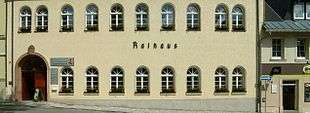
Town council
The town council of Oberwiesenthal consists of 14 councillors and the directly elected mayor or Bürgermeister, who presides over the council. The local elections of 7 June 2009, which had a voter participlation of 62.5%, the following result:
| Party | FDP | CDU | BfW | Die Alternative | Die Linke | Total |
| Seats | 5 | 5 | 2 | 2 | 0 | 14 |
| Stimmenanteil | 35.1% | 33.4% | 13.5% | 12.6% | 5.4% |
Mayor
Heinz-Michael Kirsten (CDU) was elected mayor (Bürgermeister) in January 2002. By February 2002 the Annaberg district office (Landratsamt Annaberg) had declared this result void due to unpermitted election advertising. This resulted in a five-year legal battle by all sides that ended with a decision in 2007 by the Federal Administrative Court in Leipzig, that confirmed the decision in February 2007 by the administrative appeals tribunal (Oberverwaltungsgericht) of Bautzen as legal. Heinz-Michael Kirsten was then sent on leave by the regional authority (Regierungspräsidium). On 4 November 2007 a new election took place in which no party achieved an absolute majority. In the second round of elections on 18 November the independent (now FDP) candidate, Mirko Ernst, was elected mayor.
Twinnings




Culture and sights
- Fichtelberg Railway
- Fichtelberg Cable Car (the oldest cable car in Germany)
- Oberwiesenthal post coach in the style of the Deutsche Reichspost of 1939
Museum
- Ski and local history museum, Karlsbader Straße 3
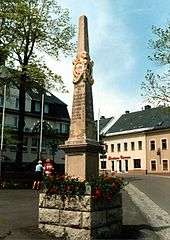
Structures
- St Martin Luther's Church with its Hertelt crib
- Distance post on the market square (Marktplatz); whole milepost on the footpath to the "New House" (Neues Haus) in the Zechengrund and remnants of a half-milepost from the village of Hammerunterwiesenthal
- Royal Saxon station stone from the market square at the Neues Haus border crossing
- Anton Günther Way, a cross-border trail
Sport
- Currently the leading sports club in the town: WSC Erzgebirge Oberwiesenthal
- Leading former East German Alpine and Nordic ski club, disbanded in 1990: SC Traktor Oberwiesenthal
- Sportfördergruppe der Bundeswehr, armed forces sports centre
Notable people
- Franz Ströher (1874-1936), German hairdresser and businessman
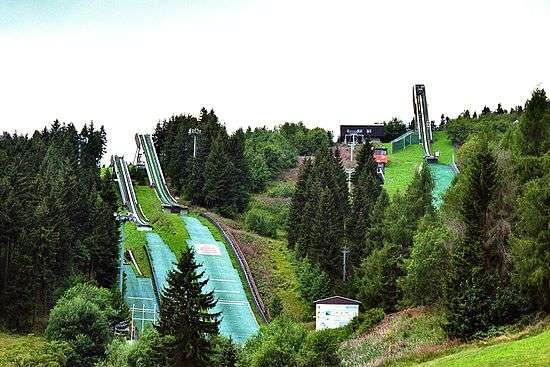
References
- "Bevölkerung des Freistaates Sachsen jeweils am Monatsende ausgewählter Berichtsmonate nach Gemeinden" (PDF). Statistisches Landesamt des Freistaates Sachsen (in German). July 2019.
- "Kurort Oberwiesenthal". Kurort Oberwiesenthal. Retrieved 16 July 2019.
- Official web site (in German)
- Das Sachsenbuch, Kommunal-Verlag Sachsen KG, Dresden, 1943, page 241
| Wikimedia Commons has media related to Oberwiesenthal. |